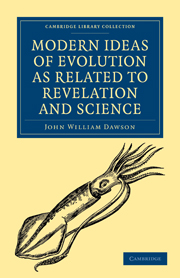Book contents
- Frontmatter
- PREFACE
- Contents
- CHAPTER I PRESENT ASPECTS OF THE QUESTION
- CHAPTER II WHAT IS EVOLUTION?
- CHAPTER III THE ORIGIN OF LIFE
- CHAPTER IV THE APPARITION OF SPECIES IN GEOLOGICAL TIME
- CHAPTER V MONISTIC EVOLUTION
- CHAPTER VI AGNOSTIC EVOLUTION
- CHAPTER VII THEISTIC EVOLUTION
- CHAPTER VIII GOD IN NATURE
- CHAPTER IX MAN IN NATURE
- CHAPTER X GENERAL CONCLUSIONS
- APPENDIX I WEISMANN ON HEREDITY
- APPENDIX II DR. McCOSH ON EVOLUTION
CHAPTER II - WHAT IS EVOLUTION?
Published online by Cambridge University Press: 29 August 2010
- Frontmatter
- PREFACE
- Contents
- CHAPTER I PRESENT ASPECTS OF THE QUESTION
- CHAPTER II WHAT IS EVOLUTION?
- CHAPTER III THE ORIGIN OF LIFE
- CHAPTER IV THE APPARITION OF SPECIES IN GEOLOGICAL TIME
- CHAPTER V MONISTIC EVOLUTION
- CHAPTER VI AGNOSTIC EVOLUTION
- CHAPTER VII THEISTIC EVOLUTION
- CHAPTER VIII GOD IN NATURE
- CHAPTER IX MAN IN NATURE
- CHAPTER X GENERAL CONCLUSIONS
- APPENDIX I WEISMANN ON HEREDITY
- APPENDIX II DR. McCOSH ON EVOLUTION
Summary
It is quite necessary to ask this question, since under the name Evolution so many things are vaguely included that, without care, we may involve ourselves in mental confusion.
1. Evolution sometimes professes to explain the origins of things; but of this it knows absolutely nothing. Evolution can take place only where there is something to be evolved, and something out of which it can be evolved, with adequate causes for the evolution. This is admitted in terms by Darwin and his followers, but constantly overlooked in their reasoning, in which evolution is spoken of as if it were, or could be, an efficient cause. The title Origin of Species was itself a misnomer as used by Darwin. The book treated not of the origin of species, but of the transmutations of species already in existence.
2. The term Evolution as popularly used may thus include processes either modal or causal. The former implies development under adequate causes, and this is rational evolution. The latter assumes to be itself a cause, which is in the nature of things impossible. The causes of development must always be distinguished from the evolution itself. It has been the fashion to use the expression ‘factors of evolution’ to cover the causes; but it would be more honest to admit at once that there must be efficient and adequate causes for every development.
- Type
- Chapter
- Information
- Publisher: Cambridge University PressPrint publication year: 2009First published in: 1890



